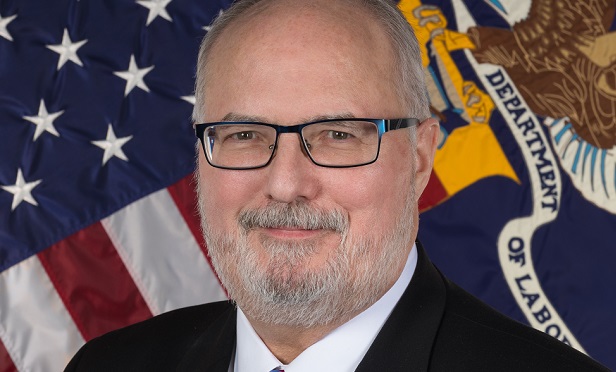 Preston Rutledge, the head of EBSA (Photo: Shawn T. Moore/DOL)
Preston Rutledge, the head of EBSA (Photo: Shawn T. Moore/DOL)
Besides prioritizing the executive orders that were issued by President Donald Trump late last year on strengthening retirement security, the Labor Department is zeroing in on missing participants, with “sub-regulatory guidance” for plan sponsors in this area in the works, Preston Rutledge, assistant secretary for Labor's Employee Benefits Security Administration, said Tuesday.
Speaking at the National Institute on Retirement Security policy conference in Washington, Rutledge said that since his arrival a year ago, Labor's “regulatory priorities are driven” by the executive orders, which address two issues: Clarifying and expanding the ability to offer multiple employer plans, or MEPs, and “to complete a review of action” on required retirement plan disclosures for participants.
DOL published a proposed rule last October that if finalized, he said, will level the playing field in offering these association retirement plans, also called MEPs.
“We may change the rule,” he said, adding that Labor is still going through the comments.
However, the missing-participants issue “is very much on our radar screen,” Rutledge continued.
EBSA, he said, is “currently taking a lot of stakeholder meetings, by stakeholders I mean employers, [third-party administrators], the recordkeepers, the folks that keep track of the participants,” in order to understand “various best practices that employers have learned, and what our department has learned, through our audits, and that we've developed over the years to find missing participants.”
As it stands now, Labor is conducting an audit program on missing participants, Rutledge relayed.
Audits of defined benefit plans conducted a few years ago found that “payments had remained unpaid for many years,” he said, which could have been due to poor recordkeeping or because of hard-to-find participants.
“In a way it doesn't matter the reason, because there's really no more basic fiduciary duty than the duty to operate the plan for the purpose of paying benefits, so falling down here is a serious matter,” Rutledge stated. “We just can't look the other way.”
Putting a number to the problem, in fiscal 2018, Labor recovered $807 million for terminated, vested participants in retirement plans, Rutledge said.
“If we end up not knowing where to send the check when the time comes, that's just an outcome that nobody wants,” he stated.
Labor's efforts, he continued, are focused on whether plan sponsors keep accurate participant benefit census records; whether they're engaged in reasonable efforts to find the participants and beneficiaries that may have moved or changed their names.
Labors efforts in the missing participants area will continue, Rutledge said, with a “long-run goal” not to “get big recoveries for participants,” but “to help employers so that participants don't go missing in the first place.”
Labor is “looking at ways that we could put out sub-regulatory guidance that can help plan sponsors that are doing the right thing or are trying to do the right thing.”
READ MORE:
Need to find retirement plan participants? Check your recordkeeper
DOL cracks down on efforts to find missing participants
401(k) truth bomb: Missing participants are bad, but cashouts are worse
© 2025 ALM Global, LLC, All Rights Reserved. Request academic re-use from www.copyright.com. All other uses, submit a request to [email protected]. For more information visit Asset & Logo Licensing.







